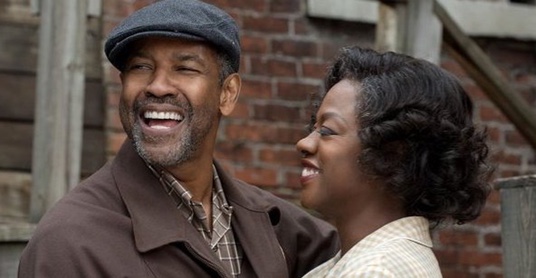
If Denzel Washington fulfills his supposed desire to turn all ten plays of August Wilson’s “Pittsburgh Cycle” (he wrote a play for each decade of the last century to dramatize the African-American experience in this country), he will go to his great reward a happy and accomplished man. Already heralded as one of our all-time greatest film stars, such an accomplishment would be a magnificent capstone to his outstanding acting career.
The role of Troy Maxon in Wilson’s Fences (which is set in the 1950s in a black Pittsburgh neighborhood) seems almost custom-made for Washington, who, in virtually all of his roles, plays “Denzel” more than any other character, something that is true for virtually all film stars. It’s difficult to imagine Washington being able to get outside of himself enough to play, say, Quasimodo, Victor Hugo’s despised hunchback. But then, few actors have the chops for roles of that depth.
However, Denzel sinks his teeth into the character of Troy, a 50-something-year-old, hardworking husband and father who is haunted and made angry by something in his past: As a young man he was an outstanding baseball player, but one who came along before the color line in the sport was breached by Jackie Robinson in 1947. In fact, Troy boasts that he was a more talented player than Robinson but never got his shot, something that negatively affects many folks of color.
When Troy’s son Cory (a gifted high school athlete in his own right) wants to try to win a college football scholarship, the father is dead set against it because he wants to protect his progeny from the disappointment he suffered at the hands of racism and discrimination. Of course the son sees the father’s protectionist tendencies as envy and is hurt in the way that only young folks can be.
But Troy’s wife Rose (played by Viola Davis who proves once again that she is among the top actors in the world that can be counted on one hand) attempts to mediate between the two men in her life without much success. Nonetheless she is steadfast in her support of Troy and isn’t afraid of him losing his job for speaking up for himself at work.
Troy works for the city’s waste collection department, “throwing cans” onto the back of a garbage truck. He wonders aloud to his friend and coworker Bono why no blacks are allowed to drive the trucks and makes plans to confront management about the issue, which perhaps could cause him a problem in terms of future employment.
However, Troy prevails at work and becomes the first black garbage truck driver in Pittsburgh. But his life is soon complicated due to a character weakness: He’s been engaged in an affair and his paramour has become pregnant. The scene in which he has to ’fess up to Rose and the multiple stages of grief she cycles through in a matter of minutes are literally painful to watch but have to be among the most poignant in cinematic history. How is Davis able to plumb such depths of emotion in front of a camera?
The plot is further complicated by the ongoing tribulations of Troy’s brother Gabe, who suffered a traumatic head injury in World War II. Veteran actor Mykelti Williamson has perhaps the most difficult role of the ensemble cast — believably playing a mentally challenged individual, but doing so without eliciting mawkish sympathy — and he pulls it off flawlessly.
Six years later Troy is dead, and his son Cory (who joined the Marines after being booted out of the house for challenging his father) returns home for the first time. The boy is now a man (or so he thinks) and he decides that he doesn’t want to attend his father’s funeral. It’s only then are we able to deduce the allegory of the title, Fences.
All throughout the film Troy had been building a small section of fence in his backyard, and what we finally learn is that the fence playwright Wilson uses is designed to keep some things out, but also to keep others in. After Rose explains some facts of adulthood to her son he really does turn into a man, and has a change of heart about attending the funeral.
Fences has Oscar written all over it, but knowing the racial politics of Hollywood (which is supposed to be this liberal bastion), it just might be too soon for another black film to win any awards, no matter how well-deserved. ‘Tis a pity that some things have not changed all that much since this work first debuted and won multiple awards on Broadway back in 1985.

From Cool Cleveland correspondent Mansfield B. Frazier mansfieldfATgmail.com. Frazier’s From Behind The Wall: Commentary on Crime, Punishment, Race and the Underclass by a Prison Inmate is available in hardback. Snag your copy and have it signed by the author at http://NeighborhoodSolutionsInc.com
One Response to “FILM REVIEW: ‘Fences’ by Mansfield Frazier”
Michael Hogan
Dear Mr. Frazier,
A friend notified me of your search for a screenwriter. (Itried to send this via mansfield@gmail.com, but the Mailer Daemon notified me twice that they could not deliver to that address.)
My name is Michael Hogan. In 1997 I sold my first screenplay to Harold Becker, a director in LA (The Onion Field, Malice, City Hall, Mercury Rising, The Boost). At his invitation I moved to LA in the late 90’s where I wrote and sold other screenplays.
Back in New York Danny Aiello read my script “18 Shades of Dust” and procured financing to make the movie. His late son Danny Aiello III directed his father in this movie. At a later time they changed the title to “Hitman’s Journal,” story of a NY mid-level mafia hitman who’s day in NY mirrors the “one day” of Leopold Bloom in Joyce’s “Ulysses.” In short the movie transposes Joyce’s 18 episodes to a NY story of some unruly characters: “Ulysses on the Hudson.”
In the early years after 9/11, I moved from NYC to Lakewood, Ohio, to practice law part-time with a college friend (I’m now a retired lawyer – Fordham Law ’76), and to write novels. I wrote and published two novels – one with Random House and one with St. Martins.
I am now writing a long (hopefully, not too long) memoir of life in the late 60’s and early 70’s with a story arc for narrator in present time. I also paint portraits of people and pets and sell approximately seven paintings per month.
I have all the experience that one might hope for in hiring a screenwriter. I started the “writing game” early on when I displayed some talent for studying English Lit. and writing poems in my twenties. In my thirties I advanced to short stories. In ’88 the late Raymond Carver wrote me an unsolicited letter complimenting me on my published story – “After the Wars,” The Amherst Review. I progressed to longer works and then discovered the exacting yet relatively “free” nature of writing scripts. (By “free” I mean the emphasis on dialogue and lesser emphasis on description of place.)
I took the Robert McKee course; I’ve read most of the books regarding the “hero’s journey,” and I’ve worked with several directors.
If there’s a drawback, I will be upfront about it: Experience takes time and as time passes we grow older. I am 66 years old, and although I’m in good health and possessed of the necessary energy to write as well as any person you might interview, I understand if you might want a younger person to write for you. I guarantee, however, that it is unlikely that any other candidate will give you the best possible product. With the humility gained over several years of experience: successes, failures, missed cues, a bad agent, one episode of “artistic” stubbornness, and the “ups and downs” of a volatile business, I can offer you the best writing, reliability, maturity and a genuine submission to the primary goal of creation.
Whatever you decide, please know I wish you good fortune and the very best luck in your endeavor.
Best wishes,
Mike Hogan
12000 Edgewater Dr.
Lakewood, OH 44107
declanhog2001@yahoo.com
h-hogan@sbcglobal.net
216 255 5135